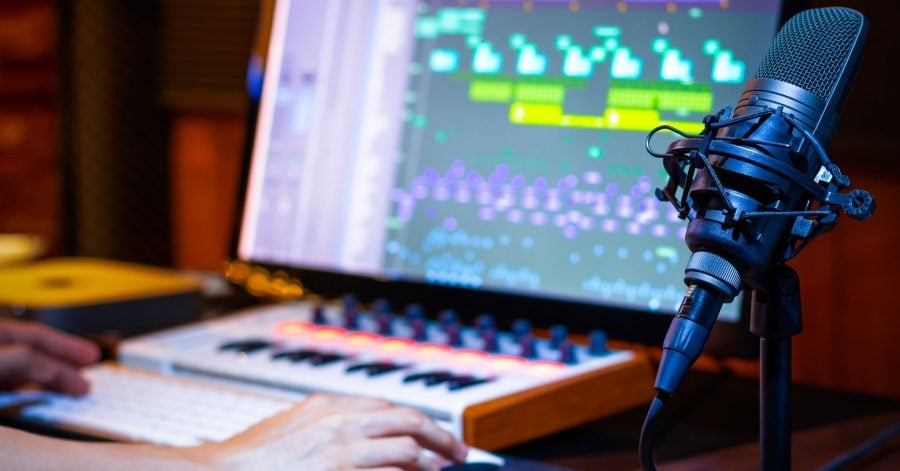“Hey, Alexa, put on some jazz” has become the new way for listening to music in many homes. With the digitalization of daily habits, both artists or producers, as well as software developers, have had to adapt and build a new entertainment infrastructure. Today we take a look at the music recording market, expected to reach almost €65B globally by 2025, its challenges, and how innovation and music tech companies are coming to the rescue.
“The music production and the technology industry in general used to be for the elite. Nowadays, it has never been easier to start becoming a music producer,” says Greek-born Maximos Maximilianos, the founder of the Bulgarian startup Audiomodern, launched in 2017.

The startup aims to develop music software that aids creatives like musicians, composers, and producers in working smarter and having fun. This means maximizing efficiency, focusing on the creative process instead of learning to navigate a complex interface.
Maximos joined the digitalization wave that technology raised in the music industry, by democratizing access to tune production. This wave has been building up in the last 5 years, with removing unsustainable materials, like CDs, and promoting digital distribution channels, like popular streaming platforms – Apple Music and Spotify.
Audiomodern is set on developing affordable software that is available in a wide range of formats and platforms, from desktops to mobile devices. His end goal is to support producers, both professionals and novices, to access it when inspiration strikes.
His music tech company has come up with a Music Creation Suite for Windows and macOS, a collection of creative audio and MIDI plugins that users, both pros and newbies, can acquire. Groove randomizer, chord machine, MIDI or gate sequencer, and motion filter are all part of Audiomodern’s solution.
“AI and ML have been making their way into the music technology industry in various forms, and we’re constantly improving our algorithms and product range with an array of new features, to make sure our users have the best experience during music production,” he adds.
The music industry’s challenges
Due to changes in consumers’ behavior, where fans want access to a wide range of new tunes daily, on their platform of choice, free, and without ads, has made many artists feel the pressure to over-perform. Reports show that there are around 137M new tracks uploaded to Spotify each year.
The impact of digitalization on the music industry is undeniable. Artists with an array of skills and from different backgrounds are generating music at a faster rate. On one hand, this can make the industry creative and competitive. But it can also mean an oversaturation of the market, a lower quality of the final product, and losing track of products’ growth.
The startups’ solutions
Here is where another music tech company is rising to meet the challenge with a creative solution. Michael Petychakis, co-founder and Chief Technology Officer of Greek-founded ORFIUM, launched in 2015, shares that they are building software solutions to help the right owners, music companies, and publishers keep track of revenue generated on digital platforms, like YouTube or Facebook.
“There are multiple links in the chain from recording studio to artist royalty payments that have not been transitioned by technology yet”, he says. Through automation, they simplify different processes, lower operational costs, improve data, and increase performance by unlocking lost revenues.

ORFIUM has various B2B solutions, like software tools to empower rights holders, management organizations, and demand-side platforms (DSPs); data, licensing, and even tailored products for all stakeholders of the entertainment industry ecosystem.
And since we’re talking about Facebook, now formally known as Meta, at the beginning of the month, the news of their latest acquisition, that of Greek-founded music tech startup – Accusonus, was announced. Accusonus is deploying AI in digital music production and processing to enable audio and video professionals and non-professionals to repair sound.
Targeting B2C, creators, with the help of the algorithms, will be able to make any audio sound feel like it has been recorded in a professional studio instead of the comfort of the house. By cleaning up audio tracks, adding background effects and music, and even modifying voices, everybody can get a chance at their “15 minutes of digital fame”.
What is next for the music industry?
Maximos shares that he is keeping an open mind when it comes to NFTs. While Michael is keeping an eye on the growth of streaming platforms expanding to new emerging markets, as well as on technologies like Blockchain and NFT’s, that he believes will serve the unmet needs of the music industry.
>>> If you want to dive deeper into other verticals boosted by technology, discover our articles on how tech startups aided







